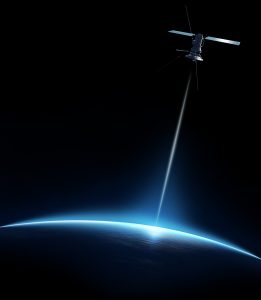A Space Lawyer’s Perspective

In the latest SpaceWatch Middle East interview series, Torsten Kriening speaks to Dr. Olga Stelmakh of McGill University, Canada. They discuss the area of global space governance. This is something that is not often discussed, yet it is critical and as space becomes an increasingly important part of life on Earth, awareness must be heightened. Dr. Olga Stelmakh offer her perspective on space law. This is part 1.
What are the goals of global space governance initiatives?
Two institutions are currently leading global space governance initiatives, notably McGill Institute of Air and Space Law and the United Nations Office for Outer Space Affairs. Here, I would like to point out that even though the initiatives are associated with these institutions, their success heavily depends on broad international participation and support provided by different space actors representing established and emerging space-faring countries, traditional and non-traditional space actors.
Despite the fact that global space governance is not new thing but a mature governance system, until recently it has remained a concept and has never been properly explored. Its elements were either directly governing space activities or attempting to govern them (quasi-governance). A couple of years ago, in the minds of many involved in space activities, the question was: is it not high time that we look at what we have before proceeding with something new? And why, at this stage, has it become so complicated to build consensus around new legal initiatives to get adequate instruments corresponding to the current level of space technology developments and changing nature of space activities? Do we need stronger interaction and exchange? Could we advance if competing means diminishing the role of co-operation?

The second Manfred Lachs International Conference on Global Space Governance, held in May 2014 by McGill, was the perfect platform for international and interdisciplinary deliberations involving 120 participants from 22 countries, all experts in different aspects of space activities. The conference concluded with the adoption of the Montreal Declaration. It was acknowledged that the global space governance system created at the dawn of space era has never been comprehensively analysed, despite numerous significant developments which have considerable implications on the conduct of space activities and their sustainability in the long-run. The Montreal Declaration called upon McGill Institute of Air and Space Law to take the lead in conducting an interdisciplinary study that examines the key drivers of space regulations and standards. It was envisaged that the study should be conducted prior to and in support of the international conference with global participation by different stakeholders.
The study is currently at its final stage. As planned, its findings will be presented at the “Fifth Manfred Lachs International Conference on Global Space Governance and the UN 2030 Agenda for Sustainable Development” which will take place from 5-6 May 2017 in Montreal, Canada. This long-anticipated event is organised by McGill Institute of Air and Space Law in association with the UN OOSA. As well as presenting the outcomes of the study, the conference also wants to attract new speakers and perspectives. To this end, the conference organizers have launched a call for papers (for more info please visit the conference web-page ).
It is also worth noting that UN OOSA recently mentioned governance in terms of the development of a legal regime governing activities in outer space for peaceful purposes.
In addition, the UNISPACE +50 to be held in 2018 (for more information please visit the LINK ), marks the fiftieth anniversary of the first UNISPACE conference. This is an opportunity to strengthen unified efforts at all levels and amongst all relevant stakeholders to shape global space governance. Among 7 UNISPACE +50 thematic priorities endorsed by the UN COPUOS in 2016 was global space governance, more specifically its current and future perspectives.
Initiatives such as these serve as catalysts for global space governance. However,their value will be undermined if not consciously perceived by all actors. In my humble opinion the initiatives come alive only when all the pieces of the puzzle are brought together. For this, an active international participation and commitment is a must, bearing in mind that operating in a bubble is not an option and all space actors are responsible to make global space governance efficient and adequate enough to face challenges of 21st century and beyond, and respond to the needs of the NewSpace economy.

Who will benefit and how from it? Why do we/the world need the space governance initiative?
Every system requires comprehensive examination of its performance and space governance is not an exception.
It is my understanding that a clear picture of how the global space governance is designed today could ensure a certain level of predictability and orderly conduct of space activities. When projecting the future of global space governance, its further evolution could boost the integration of / dialogue amongst space actors aimed at negotiating the space-related problems that affect more than one state. As of today, we observe a significant level of decentralisation of regulation and its significant fragmentation that is extremely disadvantageous.
However, I do believe that we have not only to review the current, somewhat obsolete governing framework, but to apply critical thinking and to take a broader approach as we strive for a new frontier. The comprehensive nature of global space governance requires a systematic and interdisciplinary approach. Space governance-related initiatives with international engagement are needed to get a clear picture of what is in place, what are the existing mechanisms, how complementary / repetitive they are, where is the room / need for improvement, are there any legal / regulatory lacunas etc.? My understanding is that the key is to ask the right questions and to analyse how well global space governance is defining its indicators. This approach was presented by myself in Dubai at the inaugural United Nations/United Arab Emirates – High Level Forum: Space as a Driver for Socio-Economic Sustainable Development at the end of November 2016 (presentation is available following the LINK ). The event was one of a three-year series (2016-2018) of High-Level Fora and represented a unique opportunity for the collective space community to address future global space governance leading up to the fiftieth anniversary of the First UN Conference on the Exploration and Peaceful Uses of Outer Space UNISPACE+50 in 2018. The deliberations were built around four pillars: space economy, space society, space accessibility and space diplomacy.
Will be continued.
Original published at: http://spacewatchme.com/2017/01/global-space-governance-part-1/
 SpaceWatch.Global An independent perspective on space
SpaceWatch.Global An independent perspective on space

